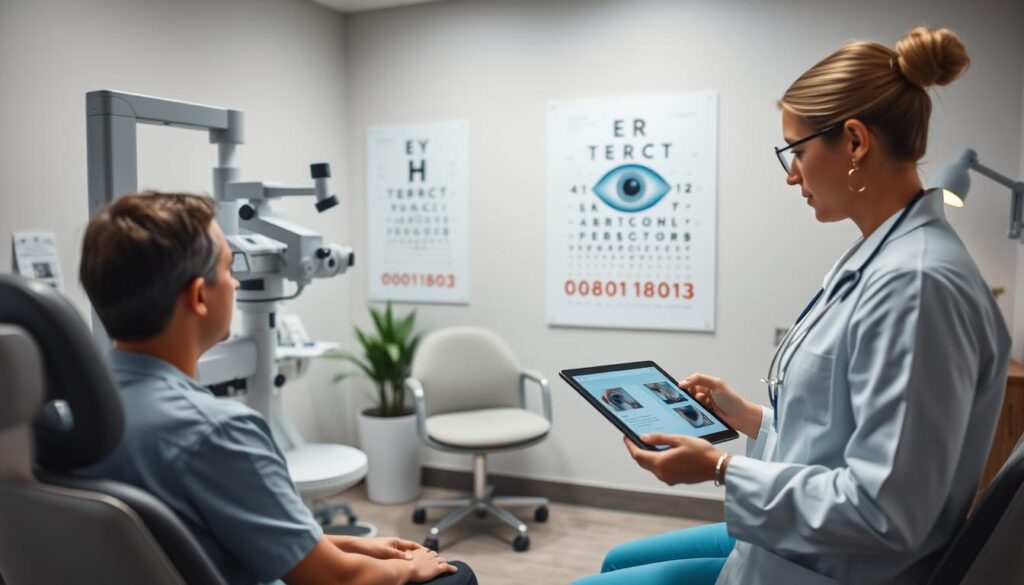It’s very important to take care of your eyes. This helps keep your vision clear and your eyes healthy for life. Many people don’t think about eye care until they have vision problems, and then they start thinking about how can you keep your eyes healthy. But, by following some key tips, you can keep your eyes safe and healthy.
We will talk about many ways to care for your eyes. This includes protecting them from the sun, eating foods good for your eyes, and exercising your eyes. We will also cover good hygiene, taking breaks from screens, and getting eye exams. Plus, we’ll discuss managing health issues that can affect your eyes and making lifestyle changes for better vision.
By sticking to these tips, you can lower your chance of getting eye problems like cataracts and glaucoma. So, let’s start learning how to keep your eyes healthy and your vision sharp!
Key Takeaways
- Protect your eyes from UV rays by wearing sunglasses and wide-brimmed hats outdoors
- Eat a diet rich in vitamins A, C, E, and omega-3 fatty acids for optimal eye health
- Exercise your eyes regularly with focusing exercises and breaks from digital screens
- Practice good hygiene by washing hands before touching eyes and properly cleaning contact lenses
- Get comprehensive eye exams annually to catch and treat any developing eye issues early
Page Contents
Protect Your Eyes from the Sun
Being outside is fun, but we must protect our eyes from the sun. The sun’s UV rays can cause eye problems like cataracts and macular degeneration. Here are two ways to keep your eyes safe:
Wear Sunglasses with UV Protection
Get sunglasses that block 100% of UV rays. They should protect against UVA and UVB rays. When picking sunglasses, think about these:
- Look for labels that read “UV 400” or “100% UV protection.”
- Choose big frames or wrap-arounds for better coverage
- Make sure they fit well and stay on your face
Wear your sunglasses even on cloudy days. UV rays can go through the clouds.
Use Wide-Brimmed Hats for Added Protection
Wearing a wide-brimmed hat is also good for your eyes. Hats with wide brims:
- Block sunlight from hitting your eyes
- Lessen UV rays on your face
- Shield your eyelids and face skin from sun damage
For the best protection, pick a hat with a brim over 3 inches wide. Here are some good hat choices for different activities:
| Activity | Recommended Hat Style |
|---|---|
| Beach or Pool | Wide-brimmed sun hat or bucket hat |
| Hiking or Gardening | Wide-brimmed sunhat or baseball cap |
| Sports or Running | Lightweight, breathable cap or visor |
Wearing sunglasses and wide-brimmed hats helps protect your eyes. This keeps your eyes healthy for a long time.
Maintain a Balanced Diet
Eating well is key for good eyesight. Eating foods full of good stuff helps keep your eyes healthy. Let’s look at what foods are best for your eyes.
Include Fruits and Vegetables Rich in Vitamins A, C, and E
Vitamins A, C, and E are great for your eyes. You can find them in many fruits and veggies. Here are some good ones:
- Vitamin A: Carrots, sweet potatoes, spinach, kale, and butternut squash
- Vitamin C-rich foods include citrus fruits, berries, bell peppers, and broccoli.
- Vitamin E: Almonds, sunflower seeds, avocados, and spinach
Eating a variety of colorful fruits and veggies is good. They give you lots of vitamins and antioxidants for your eyes.
Consume Omega-3 Fatty Acids
Omega-3 fatty acids are important for your retinas. They help prevent dry eyes. Here are some good sources:
- Fatty fish: Salmon, sardines, mackerel, and herring
- Flaxseeds and chia seeds
- Walnuts
- Omega-3 fortified eggs
Eat these foods at least twice a week. This helps keep your eyes healthy.
By eating right, you can protect your eyes. A diet full of vitamins, minerals, and omega-3s keeps your vision clear and healthy.
Exercise Your Eyes Regularly
Your eye muscles need exercise just like any other muscle. Doing simple eye exercises daily can boost your eye muscle strength. This helps your vision get better. These vision improvement exercises are easy and can be done anytime, anywhere.
The “20-20-20” rule is a great eye exercise. Every 20 minutes, take 20 seconds to look at someplace 20 feet away. This cuts down eye strain from screens.
The “figure eight” exercise is another easy one. Picture a big figure eight 10 feet away. Move your eyes along it slowly. Do this a few times in both directions to strengthen your eyes.
Here are a few more eye exercises you can try:
| Exercise | Description | Benefits |
|---|---|---|
| Eye Rolling | Roll your eyes in a circular motion, both clockwise and counterclockwise. | Improves eye muscle flexibility and reduces strain. |
| Near and Far Focusing | Alternate your focus between a near object and a far object. | Enhances your eyes’ ability to focus and adjust. |
| Palming | Rub your hands together to generate heat, then gently cup them over your closed eyes. | Relaxes your eye muscles and reduces fatigue. |
While eye exercises help keep your eye muscle strength up, they’re not a full replacement for eye care. Always see your eye doctor for the best advice and treatment.
Practice Good Hygiene
Keeping your eyes clean is key to avoiding infections and keeping them healthy. Simple habits can help a lot. This way, you can lower the chance of eye problems.
Wash Your Hands Before Touching Your Eyes
Washing your hands before touching your eyes is very important. Our hands touch many things, picking up germs. These germs can easily get into your eyes.
It helps to wash your hands for 20 seconds with soap and water. It removes harmful germs and lowers the risk of eye infections.
Clean Your Contact Lenses Properly
If you wear contact lenses, it’s crucial to take care of them. Always wash your hands before touching them. Use a fresh, clean solution for cleaning and storing.
Don’t use tap water or spit to clean your lenses. These can bring bad bacteria into your eyes. Also, change your lenses as often as you should and don’t wear them too long.
By following these easy steps, you can keep your eyes healthy and infection-free. Remember, keeping your hands clean and taking care of your contact lenses is very important for your eye health.
Take Regular Breaks from Digital Screens
In our world full of screens, digital eye strain is a big worry. Looking at screens for too long can hurt our eyes. It’s key to take breaks and use screens wisely.
The 20-20-20 rule is a great tip. Every 20 minutes, look away for 20 seconds at something 20 feet off. This helps your eyes relax and work better. Use a timer or app to remember to do this all day.
Adjust Your Screen’s Brightness and Contrast
To avoid eye strain, adjust your screen’s brightness and contrast. Your screen should match the light around you. Make it comfy to look at without glare or squinting. Also, higher contrast makes text and images clearer, easing eye strain.
Here are more tips for eye health with digital devices:
- Your screen should be at arm’s length and just below eye level.
- Use a matte screen filter to cut down glare
- Blink often to keep your eyes moist
- Think about wearing computer glasses or blue light filters
By taking breaks, adjusting your screen, and good habits, you can lessen eye strain from screens. Small changes in your screen use can greatly help your eye health.
Get Regular Eye Check-ups
It’s key to get eye exams often to keep your eyes healthy. These exams check your vision and eye health. Your doctor will look at your vision and check for eye diseases.
Your age and health decide how often you should have an eye exam. The American Optometric Association has some rules:
| Age Group | Recommended Eye Exam Frequency |
|---|---|
| Infants (birth to 24 months) | At 6 months of age |
| Preschool children (2 to 5 years) | At 3 years of age |
| School-age children (6 to 18 years) | Before first grade and every 2 years thereafter |
| Adults (19 to 64 years) | Every 2 to 4 years |
| Seniors (65 years and older) | Every 1 to 2 years |
Eye exams help find diseases early. Glaucoma, cataracts, and macular degeneration can sneak up on you. Your doctor can spot these and treat them before it’s too late.

Regular visits also help keep your prescription up to date. If you wear glasses or contacts, your vision can change. Getting your prescription updated keeps your vision clear.
If you have a family history of eye problems, you should get exams more often. Conditions like diabetes or high blood pressure can hurt your eyes. A doctor can watch your eyes closely to prevent problems.
Manage Chronic Conditions
Keeping your eyes healthy is linked to managing diseases like diabetes and high blood pressure. These diseases can harm your eyes, causing problems like diabetic retinopathy and glaucoma. By controlling these diseases, you can lower the risk of eye issues and keep your vision sharp.
Control Diabetes and High Blood Pressure
If you have diabetes or high blood pressure, it’s important to work with your doctor. Regular check-ups, taking your medicine, and making healthy lifestyle choices can help. These steps can prevent or slow eye problems linked to these diseases.
For those with diabetes, keeping blood sugar levels stable is crucial. This helps avoid diabetic retinopathy, a major cause of blindness. Here’s how:
- Eat a balanced diet with less sugar and refined carbs
- Stay active with regular exercise
- Take your medicines as your doctor says
- Check your blood sugar often
For high blood pressure, controlling it is key to avoid eye problems. Ways to manage it include:
- Keep a healthy weight
- Watch your sodium intake
- Exercise regularly
- Manage stress
- Take your medicines as needed
By managing diseases like diabetes and high blood pressure, you protect your eyes. Work with your healthcare team to create a plan. This plan will help you control these diseases and keep your eyes healthy.
How to Keep Healthy Your Eyes Through Lifestyle Changes
Making good lifestyle choices can really help your eye health. Quitting smoking and keeping a healthy weight are key. These changes can lower your risk of eye problems and make you feel better overall.
Quit Smoking for Better Eye Health
Smoking harms your lungs, heart, and eyes. Stopping is important for your vision. Smokers face a higher risk of cataracts, macular degeneration, and optic nerve damage.
| Eye Condition | Increased Risk for Smokers |
|---|---|
| Cataracts | 2-3 times higher |
| Age-Related Macular Degeneration | 2-4 times higher |
| Optic Nerve Damage | Up to 16 times higher |
Stopping smoking is tough, but help is out there. You can use nicotine gum, prescription meds, or join a support group. Quitting can greatly lower your risk of eye problems and protect your vision.
Maintain a Healthy Weight
Keeping a healthy weight is also vital for your eyes. Being too heavy raises your risk of diabetes. Diabetes can cause diabetic retinopathy, which harms the retina and can lead to vision loss.

Eat well and exercise to stay healthy. Eat lots of fruits, veggies, whole grains, and lean meats. Aim for 150 minutes of moderate exercise or 75 minutes of hard exercise each week.
By making these lifestyle changes, you can lower your risk of eye problems. Start making these changes now for better vision and health in the future.
Conclusion
Keeping your eyes healthy is key for your well-being. Follow these tips to protect your eyes. Wear sunglasses with UV protection and eat foods rich in vitamins and omega-3s.
Take breaks from screens to avoid eye strain. Good hygiene, like washing hands before touching your eyes, is important. Also, clean your contact lenses right.
Regular eye exams are a must. They help catch problems early. If you have diabetes or high blood pressure, manage them well for your eyes.
Changing your lifestyle can also help your eyes. Quit smoking and stay at a healthy weight. These habits keep your eyes strong for a long time.
FAQs
How can I protect my eyes from the sun?
Wear sunglasses with UV protection. Use wide-brimmed hats too. This keeps your eyes safe from the sun.
What foods are good for eye health?
Consume foods that are high in vitamin A, C, and E. Carrots, spinach, and kale are good. So are citrus fruits. Omega-3 fatty acids in fish and nuts also help.
Can eye exercises improve my vision?
Yes, eye exercises keep your eyes strong. Try rolling your eyes and focusing on near and far objects. Gently massage your eyelids too.
How can I prevent eye infections?
Wash your hands before touching your eyes. Clean and store contact lenses right. This keeps your eyes healthy.
What is the 20-20-20 rule for digital eye strain?
Follow the 20-20-20 rule. Every 20 minutes, spend 20 seconds staring at anything 20 feet away. It helps your eyes not get tired from screens.
How often should I get my eyes checked?
Get your eyes checked every 1-2 years. Or as your eye doctor says. This catches problems early and keeps your vision good.
Can chronic conditions affect my eye health?
Yes, diabetes and high blood pressure can harm your eyes. Treat these conditions well. This lowers the risk of eye problems.
How does smoking impact eye health?
Smoking raises the risk of eye diseases. Quitting smoking is key to better eye health and overall health.
Can maintaining a healthy weight benefit my eyes?
Yes, a healthy weight helps your eyes. Eat well and exercise. This lowers the risk of eye diseases like diabetic retinopathy and glaucoma.

